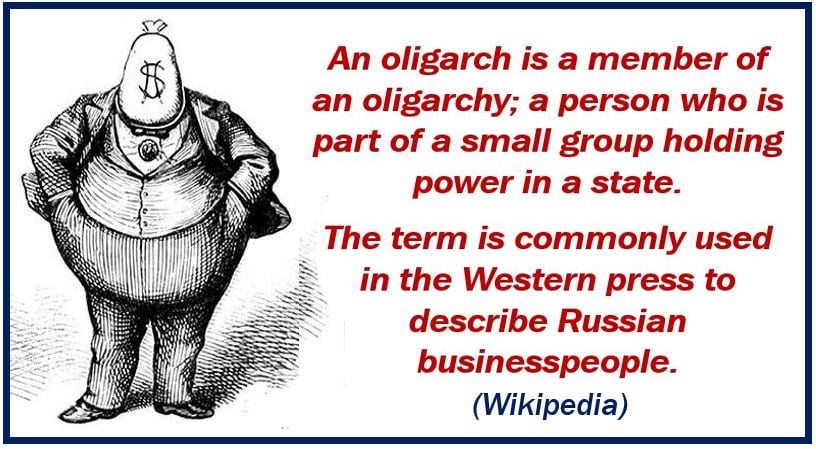An Oligarch is an extremely rich business leader who has considerable economic and political influence. The news media today uses the term a lot when talking about the multi-billionaire Russian businesspeople who are close to President Vladimir Putin. They emerged after the collapse of the Soviet Union.
We can also use the term when talking about a very powerful person in their industry.

An oligarch exists in an oligarchy
Oligarchs are the selected few individuals who influence a country’s leader(s) in an oligarchy.
An oligarchy is a society in which a few people have all the power. The leaders belong to a small privileged group. The members of this elite group, the oligarchs, typically use their power for the benefit of the group or personal gain.
Historically, the children of oligarchs were raised and groomed to become the inheritors of the oligarchy’s power. Oligarchies work much more in secret compared to aristocracies. Oligarchs prefer to operate behind the scenes, or more specifically, behind the throne.
Oligarch investments
Modern oligarchs often diversify their investments across various sectors, including media, technology, and real estate, which not only multiplies their wealth but also expands their influence beyond their primary industry.
London
Oligarchs, especially those from Russia, have purchased a lot of property in London since the turn of the century. This led to a property boom. Londoners complained because they could not afford to live near their place of work, i.e., they had to buy property outside the city and spend longer commuting.
Sports clubs
Oligarchs have purchased famous sports clubs in Western countries over the years. Here are some notable examples:
- Roman Abramovich – He purchased Chelsea Football Club, in England’s Premier League, in 2003. Abramovich, a Russian multibillionair, owned Chelsea until 2022, when he was compelled to sell the club due to sanctions imposed following the Russian invasion of Ukraine.
- Alisher Usmanov – A Russian billionaire who had a significant influence at Arsenal Football Club, which is in England’s Premier League. Although he never owned the club outright, Usmanov held a substantial shareholding through Red and White Holdings from 2007 until 2018.
- Dmitry Rybolovlev – Purchased AS Monaco, a club in France’s Ligue 1, in December 2011. He still owns the club as of my last update in April 2023.
- Mikhail Prokhorov: In 2010, he became the principal owner of the New Jersey Nets (in the US), a National Basketball Association (NBA) team.
Etymology of Oligarchy
Etymology is the study of the history and origin of words, and how their spelling, meanings, and usages evolved over time.
The term oligarchy first appeared in the English language in the 1570s, with the meaning “form of government in which supreme power is vested in a small exclusive class.”
It came from the 14th century French word Oligarchie, which came from a Latinized form of the Greek word Oligarkhia, which meant “government by the few.” The Greek words Oligoi and Arkhein mean “few” and “to rule”, respectively.
